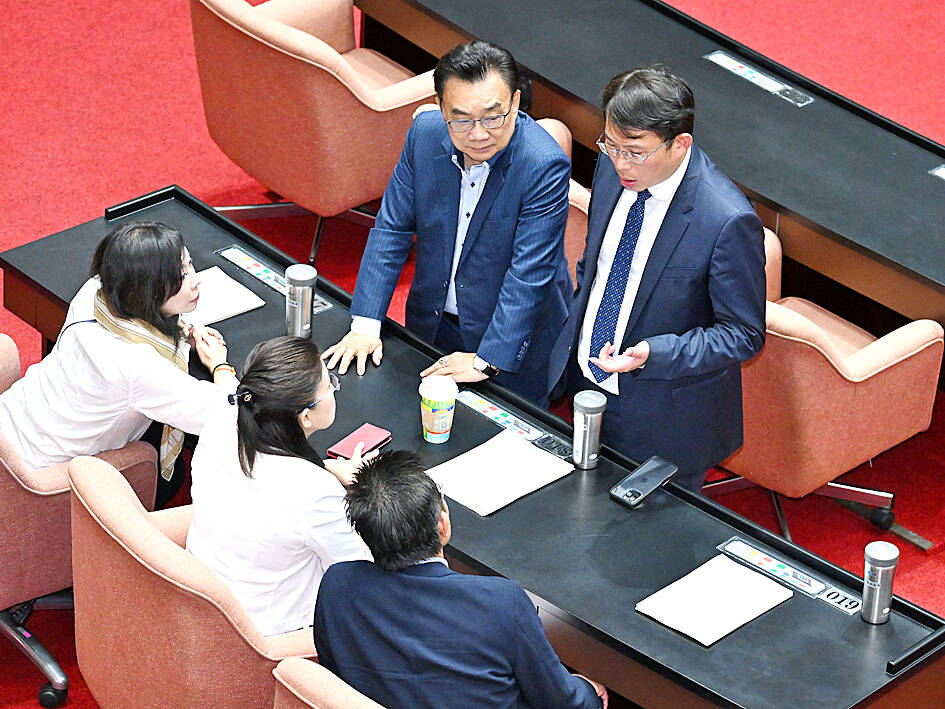Information she requested from the Ministry of National Defense is not confidential, and people have the right to know, Taiwan People’s Party (TPP) Legislator Lin Yi-chun (林憶君) said yesterday in response to questions that she was collecting sensitive data on the operations of critical infrastructure.
Lin on Wednesday invited Minister of National Defense Wellington Koo (顧立雄) and other officials to a meeting with the legislature’s Foreign Affairs and National Defense Committee, of which Lin is convener, to report on the countermeasures against the Chinese People’s Liberation Army’s “gray zone” warfare tactics and “anaconda” strategy in terms of key industries, critical infrastructure, energy independence and food security.
An official who requested anonymity told the Liberty Times (sister paper of the Taipei Times) that the legislature mischaracterized the policy to develop a “resilient Taiwan” as cultivating a militia, while systematically collecting relevant data despite explanations from the executive branch.

Photo: Chen Yi-kuan, Taipei Times
“The handling of such data might be beyond the legislative power of oversight,” they added.
Lin yesterday said the administration of President William Lai (賴清德) should be open and transparent with information in its collaboration with civic groups on defense resilience.
The legislature oversees the executive branch to ensure people’s right to know, she said, adding that the official who accused her of intelligence gathering did not even dare to reveal their name.
Lin also said she would have convened a confidential meeting if the data were sensitive.
TPP caucus whip Huang Kuo-chang (黃國昌) condemned the official for anonymously defaming Lin and opposition parties.
Democratic Progressive Party (DPP) caucus secretary-general Rosalia Wu (吳思瑤) yesterday before a DPP caucus meeting told reporters that concerns were raised about Chinese agents who are tasked with collecting intelligence on national security and defense from the executive branch.
The proceedings added up to a “plot” to undermine Taiwan’s whole-of-society defense security, as Lin scheduled the meeting following the draft amendments to the Civil Defense Act (民防法) that had been proposed by Chinese Nationalist Party (KMT) Legislator Hsu Chiao-hsin (徐巧芯), she said.
Therefore, the DPP caucus yesterday took pre-emptive action by motioning a bill to enhance defense of national security, Hsu said, adding she hoped the bill would soon be slated for review.

Taiwanese can file complaints with the Tourism Administration to report travel agencies if their activities caused termination of a person’s citizenship, Mainland Affairs Council Minister Chiu Chui-cheng (邱垂正) said yesterday, after a podcaster highlighted a case in which a person’s citizenship was canceled for receiving a single-use Chinese passport to enter Russia. The council is aware of incidents in which people who signed up through Chinese travel agencies for tours of Russia were told they could obtain Russian visas and fast-track border clearance, Chiu told reporters on the sidelines of an event in Taipei. However, the travel agencies actually applied

New measures aimed at making Taiwan more attractive to foreign professionals came into effect this month, the National Development Council said yesterday. Among the changes, international students at Taiwanese universities would be able to work in Taiwan without a work permit in the two years after they graduate, explainer materials provided by the council said. In addition, foreign nationals who graduated from one of the world’s top 200 universities within the past five years can also apply for a two-year open work permit. Previously, those graduates would have needed to apply for a work permit using point-based criteria or have a Taiwanese company

The Shilin District Prosecutors’ Office yesterday indicted two Taiwanese and issued a wanted notice for Pete Liu (劉作虎), founder of Shenzhen-based smartphone manufacturer OnePlus Technology Co (萬普拉斯科技), for allegedly contravening the Act Governing Relations Between the People of the Taiwan Area and the Mainland Area (臺灣地區與大陸地區人民關係條例) by poaching 70 engineers in Taiwan. Liu allegedly traveled to Taiwan at the end of 2014 and met with a Taiwanese man surnamed Lin (林) to discuss establishing a mobile software research and development (R&D) team in Taiwan, prosecutors said. Without approval from the government, Lin, following Liu’s instructions, recruited more than 70 software

Chinese spouse and influencer Guan Guan’s (關關) residency permit has been revoked for repeatedly posting pro-China videos that threaten national security, the National Immigration Agency confirmed today. Guan Guan has said many controversial statements in her videos posted to Douyin (抖音), including “the red flag will soon be painted all over Taiwan” and “Taiwan is an inseparable part of China,” and expressing hope for expedited reunification. The agency last year received multiple reports alleging that Guan Guan had advocated for armed reunification. After verifying the reports, the agency last month issued a notice requiring her to appear and explain her actions. Guan